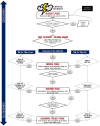'Engage me in taking care of my heart': a grounded theory study on patient-cardiologist relationship in the hospital management of heart failure
- PMID: 25776041
- PMCID: PMC4369000
- DOI: 10.1136/bmjopen-2014-005582
'Engage me in taking care of my heart': a grounded theory study on patient-cardiologist relationship in the hospital management of heart failure
Abstract
Objective: In approaching the study and practice of heart failure (HF) management, authors recognise that the patient-doctor relationship has a central role in engaging patients in their care. This study aims at identifying the features and the levers of HF patient engagement and suggestions for orienting clinical encounters.
Design: Using a grounded theory approach, we conducted 22 in-depth interviews (13 patients with HF, 5 physicians and 4 caregivers). Data were collected and analysed using open, axial and selective coding procedures according to the grounded theory principles.
Settings: All interviews were conducted in an office in a university hospital located in a metropolitan area of Milan, Italy.
Participants: The data comprised a total of 22 patient, hospital cardiologist and caregiver interviews. Patients aged ≥18 years with New York Heart Association (NYHA) Functional Class of II or III were eligible to take part. Patients were recruited primarily through their referral cardiologist.
Results: The HF patient engagement process develops in four main phases that are characterised by different patients' emotional, cognitive and behavioural dynamics that contribute to shape the process of a patient's meaning making towards health and illness regarding their care. The emerging model illustrates that HF patient engagement entails a meaning-making process enacted by the patient after the critical event. This implies patients' ability to give sense to their care experience and to their disease, symptomatology and treatments, and their changes along their illness course. Doctors are recognised as crucial in fostering patients' engagement along all the phases of the process as they contribute to providing patients with self-continuity and give new meaning to their illness experience.
Conclusions: This study identifies the core experiential domains and the main levers involved in driving patients with HF to effectively engage in their disease management. The model emerging from this study may help clinicians think in a fresh way about encounters with patients and their role in fostering their patients' health engagement.
Keywords: QUALITATIVE RESEARCH; patient engagement.
Published by the BMJ Publishing Group Limited. For permission to use (where not already granted under a licence) please go to http://group.bmj.com/group/rights-licensing/permissions.
Figures
References
MeSH terms
LinkOut - more resources
Full Text Sources
Other Literature Sources
Medical
Research Materials
Miscellaneous

